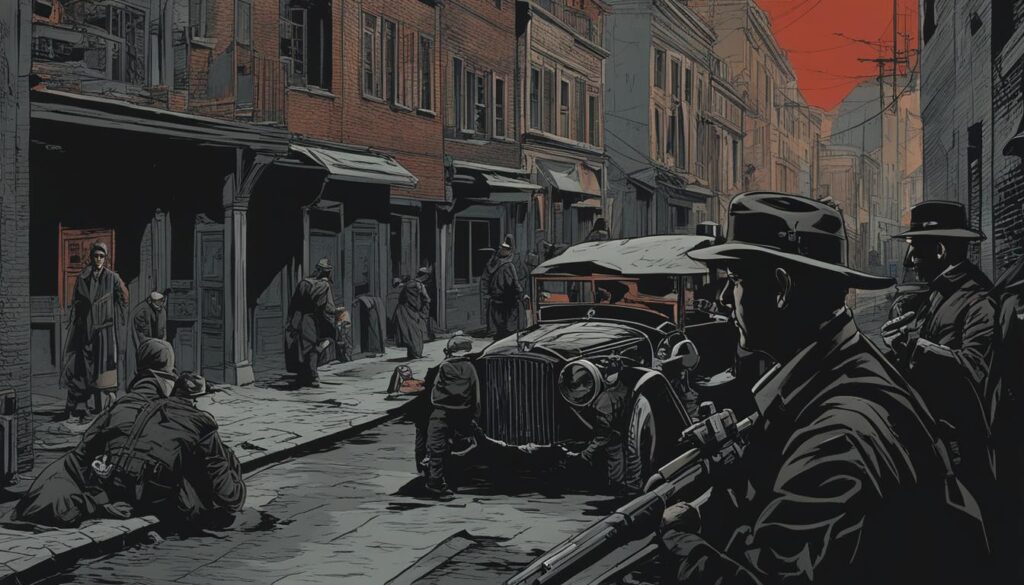With the rising tide of espionage thrillers capturing the imagination of readers worldwide, audiobooks have carved a niche by delivering stories in a format that intensifies the experience. An audiobook offers not only the narrative but also layers of vocal subtleties that can enhance the already gripping nature of a spy novel. Among such auditory feats, “The Ghost War” by Alex Berenson emerges as a shining example that enriches the audiobook listening experience with its complex web of deception and intrigue.
This review invites both aficionados and newcomers of the genre to delve into a world where every whispered word holds weight and the sound of silence speaks volumes. Dive into this immersive listening journey and discover how “The Ghost War” resonates as a compelling addition to your espionage collection, and why it elevates the benchmarks for quality storytelling in the realm of audio espionage narratives.
An Introduction to Alex Berenson’s “The Ghost War”
Immersing into the world of espionage and nail-biting action, Alex Berenson stands as a prominent figure in the realm of spy novels. His compelling thriller series, of which “The Ghost War” is a celebrated part, showcases his adeptness as an espionage author. Berenson’s journey from investigative journalism to publishing thought-provoking fiction has earned him a reputation for intricate plotlines and fast-paced narratives that keep readers on the edges of their seats.
Before delving deeper into “The Ghost War,” it is essential to understand the caliber and background of the man behind the words. Berenson’s forte lies in weaving his extensive knowledge of global politics and intelligence into his stories, producing a series that resonates with verisimilitude and authenticity.
Here is a glimpse into Alex Berenson’s notable contributions to the espionage thriller genre:
- Prior experience as a reporter for The New York Times covering topics related to intelligence and the war on terror.
- His debut novel was not only received with high praise but also won the coveted Edgar Award for Best First Novel by an American Author.
- “The Ghost War,” admired for its seamless blend of fact and fiction, further established Berenson’s stature in espionage literature.
- Persistence in providing gripping tension through complex characters and realistic scenarios has become a trademark of his storytelling prowess.
Readers have repeatedly turned to Berenson’s works for both entertainment and insightful commentary on international espionage. His ability to craft a story that feels both prophetic and possible secures his place among the modern masters of the genre.
| Book Title | Publication Year | Award/Accolade |
|---|---|---|
| “The Faithful Spy” | 2006 | Edgar Award Winner |
| “The Ghost War” | 2008 | New York Times Bestseller |
| “The Silent Man” | 2009 | N/A |
The above table underscores the milestone achievements of Alex Berenson’s literary career, with “The Ghost War” being a pivotal addition to his expanding collection. It is not just a mere sequel but a stepping stone that enhances the entire espionage thriller series to greater heights. Indeed, Alex Berenson’s works are not just about the thrill of chase and cloak-and-dagger operations but about inviting readers to explore the intricate dance of global intelligence with a level of detail that few authors can claim.
Unpacking the Plot: A Deep Dive into “The Ghost War”
To truly understand the magnetism of “The Ghost War,” it is essential to dissect the narrative’s anatomy. This book delivers a potently concocted mix of suspense, propelled by a sophisticated espionage plotline and a backdrop rife with geopolitical tension. The intricate design of the plot becomes clearer when we unravel the central conflict, distinguish the global settings, and scrutinize the defining qualities and aspirations of pivotal characters who drive this immersive story.
Overview of the Central Conflict
The lifeblood of any compelling narrative is conflict, and “The Ghost War” presents an intricate web of hostilities and clandestine operations that epitomizes top-tier espionage literature. It’s not just about the adrenaline-pumping danger but also the mental chess game between formidable adversaries. The central narrative is powered by a plot analysis that reveals a delicate balance of power teetering on the brink, pulling the reader into the vortex of thrills and high-stakes maneuvering.
Setting and Geopolitical Landscape
“The Ghost War” transports us across a canvas of locales pivotal to global stability, where the setting does more than establish a physical backdrop—it shapes the story’s very essence. A deep plot analysis shows us that the locales are not random; they are selected with purpose, reflecting current geopolitical tension and the strategies within international espionage. These places, rendered with vivid detail, aren’t just maps to be navigated, but environments where political ambition and treachery play out.
Key Characters and Their Motivations
Characters are more than names on a page; they’re vessels of ambition, fear, and conflict. In “The Ghost War,” motivations are meticulously layered, each character acting out of their own set of desires and pressures that reflect not only personal but also geopolitical tensions. A robust plot analysis involves peeling back these layers, looking beyond actions to unearth the intricate motivations that put these characters on a collision course.
| Character | Role in the Plot | Motivation | Contribution to Geopolitical Tension |
|---|---|---|---|
| Protagonist | Undercover Operative | Personal redemption and duty to country | Centerpiece in a battle of wits and loyalty on an international scale |
| Antagonist | Rogue Agent | Power and ideological supremacy | Embodies the realpolitik driving nations to the brink of covert war |
| Supporting Character 1 | Intelligence Analyst | Uncovering the truth | Represents the struggle to prevent escalation in times of distrust |
| Supporting Character 2 | Political Figure | Political survival and legacy | Humanizes the weight of decision-making in geopolitics |
Each character’s presence and decisions stir the pot of the story’s overarching espionage plotline, amplifying themes that resonate with the current global climate. This plot analysis offers a tantalizing blueprint of “The Ghost War” and its multifaceted narrative, showcasing Alex Berenson’s prowess in weaving the intimate dance between personal agendas and the larger-than-life theatricality of global espionage.
The Author’s Craft: Analyzing Berenson’s Writing Style
Understanding the nuances of Alex Berenson’s narrative technique offers an insightful window into the realm of espionage thrillers—a genre reliant on precision and suspense. Berenson’s approach to literary analysis stands out for his methodical writing style and ability to maintain suspense in literature. Let’s dissect the elements contributing to his distinctive style.
Masterful Suspense Building Techniques
Suspense serves as the backbone of espionage tales, and Berenson’s work is exemplary in this regard. He carefully weaves a tapestry of tension that captures and holds the reader’s attention. By rationing out information, and often through expert pacing, Berenson creates moments of intense anticipation that drive the narrative forward.
For instance, Berenson often employs short, impactful sentences amidst detailed descriptions, establishing a rhythm that mirrors the ebb and flow of suspense. His use of cliffhangers at chapter ends solidifies this technique, ensuring the reader’s investment in the unfolding events.
Realism and Research in Espionage Thrillers
AUTHENTICITY is revered in the creation of espionage narratives. Berenson’s commitment to realism is anchored in exemplary research, from geopolitical dynamics to the intricacies of intelligence operations. His portrayal of espionage is enriched with an air of legitimacy, pulling the reader into a world that feels as real as it is thrilling.
Here is how Berenson’s diligent research translates to his writing:
| Research Aspect | Impact on Narrative |
|---|---|
| Geopolitical Knowledge | Provides a convincing backdrop relevant to current affairs and historical events. |
| Military and Espionage Tactics | Adds credibility to the actions and decision-making processes of characters. |
| Technological Accuracy | Offers a believable portrayal of the tools and methods used in modern espionage. |
Dialogue and Characterization
Dialogue serves as a powerful vessel for characterization, and Berenson’s characters are fleshed out through interactions that are as varied as they are deep. The conversations between characters do more than push the story forward—they provide a glimpse into the psyche of the individuals involved, revealing motives, fears, and personalities.
“One of the hallmarks of Berenson’s style is the authenticity and natural flow in the dialogue between his characters, capturing the tension and stakes of espionage.”
His protagonists are often portrayed as complex figures grappling with personal and professional conflicts, and through their dialogue, Berenson offers subtlety in their development, avoiding heavy-handed exposition. It is through their words and actions that we, as readers, are drawn into their world, aligning ourselves with their challenges and triumphs.
Themes and Messages in “The Ghost War”
In the realm of espionage thrillers, “The Ghost War” by Alex Berenson is not just a journey of adrenaline-pumping action but also a tapestry woven with intricate literary themes and thematic elements. As we delve into the underlying messages of the narrative, we confront the profound complexities of espionage ethics, loyalty, and the often-veiled power dynamics that underpin international relations. These themes are not only central to the plot but are also crucial for the elevation of the genre, as they encourage readers to engage in a broader dialogue concerning societal and ethical implications.
Exploring the Theme of Loyalty
Loyalty, often depicted as a cornerstone of personal and professional relationships, is intricately examined in the realm where operatives live dual lives. In “The Ghost War”, loyalty transcends the personal and enters the strategic domain, challenging characters to balance duty with morality, patriotism with humanity.
Power Dynamics in International Relations
The dance of dominance and submission in global politics is a persistent backdrop in the world of espionage. “The Ghost War” presents an intricate dissection of these power dynamics, painting a realistic portrayal of the strategic manoeuvring that shapes the international landscape.
The Moral Ambiguity of Espionage
The clandestine operations and the duplicity inherent in espionage work often blur the lines between right and wrong. Berenson’s narrative boldly navigates this moral ambiguity, leaving readers to ponder the justifications and ramifications of actions taken in the shadows.

Below lies a comparison of thematic expressions within “The Ghost War” that reveal the duality of thematic assertions against the stark realism depicted in Berenson’s portrayal:
| Theme | Expression in “The Ghost War” | Real-World Reflection |
|---|---|---|
| Loyalty | Characters are tested against personal bonds and national allegiance. | Real-world operatives face similar dilemmas, prioritizing mission over relationships. |
| Power Dynamics | Story arcs mirror geopolitical chess games where nations vie for control. | Mirror global realities wherein nations compete for dominance or survival. |
| Moral Ambiguity | Justifiable espionage actions conflict with personal ethics. | Real-life espionage raises questions about the morality of information-gathering practices. |
These thematic explorations in “The Ghost War” serve not only to propel the narrative but also to provoke a critical examination of the underlying forces that exist within the secretive world of international espionage.
Performance and Production: A Critique of the Audiobook
The audiobook rendition of “The Ghost War” stands as a beacon for those seeking a full-spectrum auditory experience. Beyond the written word lies an intricate soundscape that transcends conventional storytelling, intertwining voice, and sonic texture. Our audiobook critique seeks to unravel the layers of narration analysis and production quality, crucial elements that shape the listener’s journey. We examine how these components correspond with the unfolding espionage drama, enhancing the immersive experience of Alex Berenson’s narrative.
Narration Quality and Vocal Performance
The entrancing voice that breathes life into “The Ghost War” carries not just the story, but the very essence of character and tension throughout the audiobook. With deft narration analysis, we perceive how the modulations, accents, and pacing contribute to the character development and the urgency of the plot. This section dissects the skillful vocal performance that guides listeners through a labyrinth of intrigue and suspense.
Sound Design and Production Value
As we delve deeper into the auditory realm of “The Ghost War,” the undercurrents of sound design demonstrate a meticulous attention to production quality. The subtleties of background scores and the judicious use of sound effects are dissected to understand their influence on the narrative’s emotional pull and atmospheric tension. This layer of audiobook critique evaluates the production standards that complement the vocal narration.
The Impact of Audiobook Format on Storytelling
The audiobook format offers a unique vessel for storytelling, where voices and sounds conjoin to conjure vivid imagery and a potent sense of place. Here, we reflect on how this sensory medium amplifies the espionage tale, perhaps creating a different resonance compared to its print counterpart. This facet of our critique observes the symbiotic relationship between story and format, contemplating the distinctive impact it renders on the listener’s experience.
In the ensuing table, we synthesize our findings, presenting a streamlined comparison that encapsulates key aspects of our critique:
| Criterion | Evaluation | Comments |
|---|---|---|
| Narrator’s Vocal Range | Exceptional | Adapts to diverse characters with ease, reflecting their emotional depth. |
| Consistency | High | Maintains steady narrative flow and character distinctiveness throughout. |
| Emotional Engagement | Immersive | Engages listeners with compelling inflection and tone. |
| Production Elements | Harmonious | Sound effects and music enhance, not distract from, the story’s ambience. |
| Editing Quality | Crisp | Seamless edits contribute to a polished production. |
| Format Impact | Positive | Strengthens the narrative, offering a compelling alternative to the text. |
“The Ghost War” Within Alex Berenson’s Book Series
As a standout series instalment in Alex Berenson’s acclaimed book sequence, “The Ghost War” functions as a pivotal narrative tie in the author’s oeuvre. This chapter delves into how the book not only continues the intricate tale of espionage but also contributes significant layers to the overall series arc.
Understanding where “The Ghost War” falls within the series is essential for both newcomers and long-standing fans. For those just starting, it provides an entry point that teases the gravity and complexity of prior events. Meanwhile, seasoned readers will discern the nuances skillfully woven from preceding chapters, appreciate callbacks, and anticipate potential developments that could alter the series’ direction.
The evolution from each book sequence to the next showcases Berenson’s finesse in story progression. Each work is not just an independent function but a cog in a much larger machine, propelling forward a narrative that is both expansive and intimately detailed about the spy craft world.
Examining the series through the lens of “The Ghost War” provides an immersive glimpse into the enduring challenges and character transformations, making each instalment not merely a read, but an experience.
| Series Position | Book Title | Key Developments | Reader Impact |
|---|---|---|---|
| Previous | Title Preceding “The Ghost War” | Introduction of Key Characters, Initial Conflict Setup | Initial Engagement |
| Current | “The Ghost War” | Major Plot Twists, Deepened Character Arcs | Increased Investment, Series Loyalty |
| Next | Planned Sequel | Anticipated Outcomes, Character Resolutions | Forward-Looking Anticipation |
Each book within the series is a testament to Berenson’s dexterity as an author. “The Ghost War” stands as not only a testimony to his skill but as an invitation to explore the ever-deepening layers of the series’ universe. It’s a crucial landmark within the continuously unravelling tapestry that is the author’s oeuvre, underscoring the remarkable interconnectivity and foresight that define this captivating spy saga.
Character Development and Arc Progression in the Series
As avid readers explore the intricate world of espionage presented in Alex Berenson’s literary works, the deepening layers of character growth, the unfolding of substantial narrative arcs, and the dynamic interplay among series characters become focal points for analysis and appreciation. It’s these elements of continuity and evolution that offer a magnetic pull for those invested in the characters’ journeys and their implications on the overarching plotline of the series.
Throughout the novels, protagonists undergo significant transformations, provocatively mirroring the complexity of the geopolitical climates in which they operate. As events unfurl, these characters internalize their experiences, evident through their adapted behaviors and decisions that resonate with authenticity. We witness a fascinating metamorphosis as personal conflicts and allegiances mature over time, sculpting characters into fuller, more nuanced figures.
One salient aspect of this series is how these characters—confronted with moral dilemmas and high-stakes scenarios—are forced into the depths of their own psyche, revealing vulnerabilities and strengths that perhaps were previously unexamined. This internal exploration adds a robust dimension to the character personas, ensuring no individual remains static within the enthralling progression that fans have come to anticipate eagerly with each new release.
Of particular note is the way in which personal relationships among these characters forge and disintegrate in response to the shifting sands of allegiance and trust, a direct reflection of the unpredictability innate to the world of covert operations.
With an unwavering commitment to keeping the characters’ reflections of real-world conflicts and decisions, Berenson crafts a narrative where the anticipated destination is never certain, and the journey’s impact on each character’s growth is profoundly satisfying. Each installment in the series builds upon the last, engendering a deep sense of investment from the reader as they chart the triumphant highs and despairing lows that are the hallmark of Berenson’s adroit storytelling.
An eloquent testimony to Berenson’s skill is the organic manner in which characters adapt and overcome—or succumb to—challenges met along their paths. The delineation of their abilities, their evolving perspectives, and the incorporation of the past into their present personas are all integral to understanding the series as more than mere espionage thrillers; they are a canvas for studying the human condition under pressure.
- Resilience in the face of adversity
- The price of loyalty amidst treachery
- Endurance of idealism within a labyrinth of realpolitik
The portrayal of each character’s trajectory in Berenson’s works is not just a testament to narrative crafting; it serves as a symbiotic element to the escalating tension and intrigue that underscores this compelling series.
Comparisons to Other Works in the Spy Thriller Genre
The lexicon of spy thrillers is a mosaic of shadowy operatives and clandestine operations, each rendition providing unique windows into the world of espionage. Classic authors of the genre like John le Carré set a high bar with their intimate knowledge of the trade, crafting narratives that bend around the edges of reality and fiction. In the modern era, espionage novelists pride themselves on the intricate web of techno-sophistication and global crisis—elements revealed potently in Alex Berenson’s “The Ghost War.” In understanding the oeuvre’s position within the genre, a genre analysis pits it against the venerable classics as well as the varied styles of contemporary spy novelists.
Contemporary Spy Novelists and Their Styles
Today’s espionage authors formulate a broad spectrum of styles, ranging from the cerebral puzzles orchestrated by Daniel Silva to the action-packed sequences of Vince Flynn. An overarching motif is their commitment to integrating the post-9/11 socio-political landscape into their storylines—nurturing a sense of immediate relevance. They stand apart from their precedents by tilting towards what readers see beyond their windows, manifesting fears and headlines into tightly spun, accessible prose.
“The Ghost War” vs. Classic Spy Fiction
Classic tales of espionage novelists relied heavily on the detailed psychological mapping of their characters. “The Ghost War,” while sophisticated in political and military detailing, often stands at a crossroad of these approaches—melding action driven scenes with a thoughtful examination of character motivations, reminiscent of masters like Graham Greene. Where this spy thriller comparison becomes most intriguing is in the juxtaposition of Berenson’s modern technological warfare against the traditional, often romanticized, spycraft of yesteryears—a reflection of shifting paradigms within the genre.
Impact on the Genre: Innovation or Tradition?
Aforementioned, genre analysis reveals that “The Ghost War” has one foot rooted in traditional espionage elements—cloak-and-dagger tactics, loyalty conflicts, and international intrigue, while the other steps towards innovation with a contemporary framing of these issues. Berenson seems to bridge that chasm between the old guard and the new school, weaving a continuity that both acknowledges the genre’s history and anticipates its evolution, heralding yet another rebirth of this enduring literary mainstay.
Audiobook Review: Listener Reactions to “The Ghost War”
Understanding how “The Ghost War” resonates with its audience is crucial in assessing the audiobook’s impact. Listener feedback, audiobook ratings, and audience reception provide a multifaceted view of how Alex Berenson’s work is received by the public. Insights from various platforms have been gathered to formulate a comprehensive overview of listeners’ experiences and opinions on this espionage thriller.
Recurrent themes in listener feedback suggest that the audiobook strikes a chord with espionage enthusiasts. Narrated with gripping precision, the audiobook version of “The Ghost War” has prompted an outpouring of reactions from its listeners. Below, we encapsulate the essence of the audience’s reception through collected reviews and ratings, spotlighting the sentiments that perfume the airwaves of the audiobook community.
| Aspect | Positive Feedback | Constructive Criticism |
|---|---|---|
| Narration | Engaging tone and well-executed character voices | Occasional pacing concerns |
| Production Quality | High-quality sound and editing | N/A |
| Story Engagement | Compelling plot and suspenseful storytelling | Some desired deeper character development |
| Overall Experience | Immersive and captivating listen | Minor preferences for varying narrative styles |
Whether through spine-tingling excitement or the occasional desire for improvement, listeners have voiced thoughts that have, in turn, driven lively discussions within the community. This collection of audience reception outlines a predominantly positive landscape for “The Ghost War,” with its formidable strengths dwelling in the realms of its high-octane suspense and production finesse.
Prospective listeners perusing these reflections can anticipate an audiobook experience that has fetched commendable approval across audiobook forums, with mentions of a few subjective preferences that mildly sway the breadth of its acclaim.
Historical Accuracy and Its Role in the Storyline
The quest for factual accuracy in fiction is a notable hallmark of Alex Berenson’s “The Ghost War,” infusing the thrilling narrative with a sense of authenticity. This accuracy is not merely ancillary but pivotal to the plot’s progression and resonance with the readers. Berenson’s meticulous integration of historical elements enriches the narrative, allowing readers to delve into a story that mirrors the complexities of real-world geopolitics. This confluence of education and entertainment imparts substantial educational value, bridging the gap between historical texts and engaging literature.
Efforts to ensure historical fidelity in “The Ghost War” are evident in the detailed depictions of settings that have been scarred by historical events. The spy thriller painstakingly recreates environments and circumstances that echo the realities of espionage, shaped by the hands of time and policy. The result is a story that vibrates with life and truth, emanating from the carefully woven fabric of actualities and the author’s imagination.
Through this intricate dance of truth and creativity, Berenson not only captivates his audience but educates them, providing insights into the covert operations and international tensions that define the espionage landscape.
Such a deep dive into history serves as a compelling method of storytelling, where readers can enjoy the adrenaline of fiction while grounding their experience in the familiar terrain of tangible events. While the characters may be fictitious, their actions and the consequences they face are often tied to the real world’s immutable timelines. The end product is a rich story that respects the intelligence and curiosity of its audience.
| Element | Role in “The Ghost War” | Benefits to Readers |
|---|---|---|
| Historical Context | Provides a backdrop enriched by reality, creating a believable plot scenario | Increases immersion through relatable and authentic story environments |
| Real-world Events | Fosters plot intricacies that resonate with the actual ebb and flow of geopolitical affairs | Encourages critical thinking about past events and current affairs |
| Educational Insight | Introduces readers to historical nuances and clandestine operations without the dryness of academic texts | Facilitates learning through engaging narrative, blending leisure with knowledge acquisition |
The significance of factual grounding in espionage thrillers like “The Ghost War” cannot be overstated. It is not simply a stylistic choice, but a bridge that connects the realms of education and literary pleasure. The loyal audiences of Berenson’s works are treated to stories that not only entertain but also enlighten, making every page a venture into the depths of both imagination and reality.
Personal Opinions and Thoughts on “The Ghost War”
Offering a personal review of Alex Berenson’s “The Ghost War” audiobook presents an opportunity to convey a more intimate encounter with this captivating espionage thriller. The experience of immersing oneself in the audiobook comes with distinct audiobook insights and a critical perspective that only a dedicated listen can afford.
The narrative, driven by intricate plot twists and intense character developments, was bolstered by a narration able to grasp the nuances and tension inherent in such a sophisticated story. Through my listening sessions, the authentic portrayal of each character by the narrator significantly enhanced the connection to the story, making it an almost palpable experience.
But it was not just the performance that made an impact. Berenson’s ability to weave a complex and gripping narrative delivered an experience that went beyond mere entertainment. His attention to detail and seamless flow within the novel’s structured progression was both lauded and critiqued through this personal lens.
What struck me most was the way “The Ghost War” unraveled its plot, maintaining a pace that kept my attention fixed, prompting both eagerness and apprehension with every chapter.
From a critical perspective, certain moments in the plot may have progressed with predictable turns, and some characters seemed to lack the depth I anticipated. Nevertheless, these potential shortcomings never truly detracted from the overall enjoyment of the audiobook.
In reflection, the personal insights gained from the experience underscored the auditory adventure that “The Ghost War” provided. It stands as a testament to the power of well-crafted espionage stories in capturing the imagination and bringing the listener along on a journey that is both thrilling and thought-provoking.
As my review concludes, it’s clear that whether you’re a long-standing fan of spy thrillers or a newcomer to the genre, “The Ghost War” audiobook offers a compelling reason to listen closely and escape into a world of intrigue and espionage.
Further Readings and Recommendations for Spy Thriller Fans
For espionage enthusiasts seeking to delve deeper into the world of undercover operations and high-stakes intrigue, the following reading recommendations offer a variety of experiences similar to “The Ghost War.” Satisfy your craving for intelligent plots and complex characters with these acclaimed titles that have captivated readers and upheld the traditions of spy thriller literature.

Each book listed below delivers a riveting story that resonates with themes of deception, loyalty, and the ever-blurry line between right and wrong. Whether you’re looking for contemporary takes on the genre or classic narratives that shaped the foundation of spy fiction, this curated selection is sure to include something that will keep you turning pages into the early hours.
| Title | Author | Notable Elements | For Fans Of… |
|---|---|---|---|
| Tinker, Tailor, Soldier, Spy | John le Carré | Classic espionage, complex characters | Intricate narratives, Cold War settings |
| The Bourne Identity | Robert Ludlum | Amnesia, identity search, fast-paced action | Intense thrills, conspiracy theories |
| Red Sparrow | Jason Matthews | Seduction as espionage, modern spycraft | Psychological manipulation, CIA operations |
| The Spy and the Traitor | Ben Macintyre | True espionage events, deep-cover agents | Historical accuracy, real-life spy drama |
| I Am Pilgrim | Terry Hayes | Globe-trotting investigation, apocalyptic threat | Epic storytelling, complex plots |
Beyond these similar books, seekers of thrilling espionage tales may also explore works by authors like Daniel Silva, known for his sophisticated portrayal of intelligence operations, and Vince Flynn, whose action-packed narratives often spotlight counterterrorism efforts. Enthusiasts of the genre will find that each of these recommended titles echoes the gripping tension and intellectual challenges found in “The Ghost War,” making them excellent additions to any spy thriller collection.
Conclusion
As we wrap up our exploration of “The Ghost War” by Alex Berenson, it becomes abundantly clear that the intricacies and finesse of this audiobook make it a standout addition to the espionage thriller shelf. The final assessment of the audiobook not only highlights its merits in storytelling and production quality but also sheds light on the rich and detailed world Berenson has woven with his commendable writing skills. With a narrative as gripping as it is thought-provoking, it holds a mirror to the hallmarks and challenges of spy fiction, offering a fresh lens through which to view the genre.
Final Verdict on “The Ghost War” by Alex Berenson
The final assessment converges upon the book’s engaging plot, sophisticated character development, and the commitment to the ambiance of suspense and geopolitical intrigue that defines Berenson’s work. Fans of spy novels will likely find themselves thoroughly immersed in the narrative, appreciating the balance between entertainment and the complexities of espionage ethics.
Future Predictions for the Series and Genre
Looking ahead, the espionage series future seems promising, with “The Ghost War” setting high expectations for subsequent releases. Berenson’s storytelling holds the potential to influence upcoming spy thrillers, perhaps steering the genre towards more nuanced and grounded portrayals. Anticipation builds as to how Berenson will evolve his characters and plotlines in response to an ever-changing geopolitical climate.
Engaging the Community: Share Your Thoughts
Your engagement is the heartbeat of this conversation. We are keen to encourage active reader engagement and invite you to share your personal reflections on “The Ghost War.” Did Berenson’s depiction of espionage resonate with you? How do you see the themes playing out in real-world scenarios? Your insights are invaluable as they deepen the discussion and foster a robust community of spy novel aficionados. Let’s keep the discourse alive and continue to unravel the intricacies of this captivating genre together.



